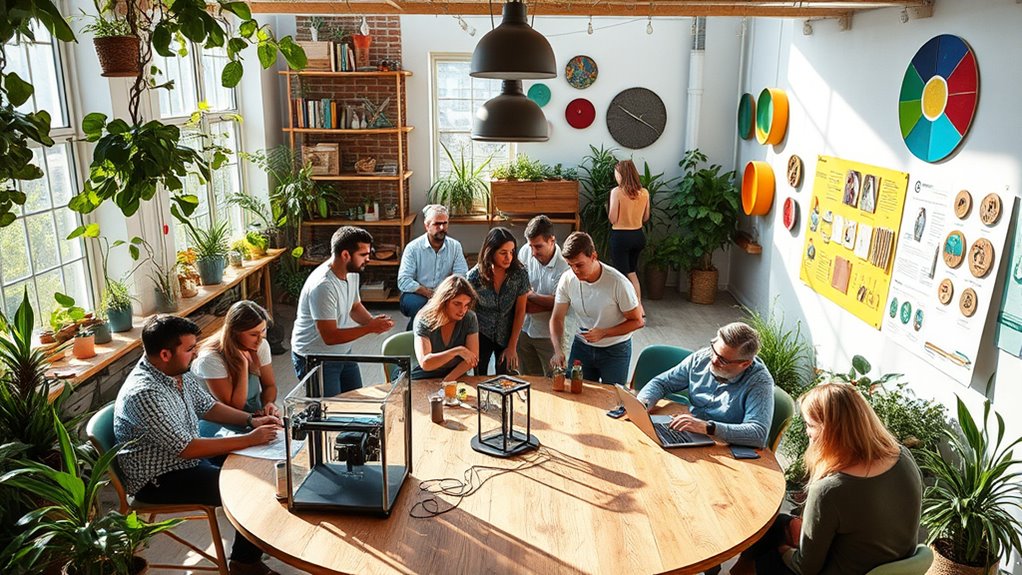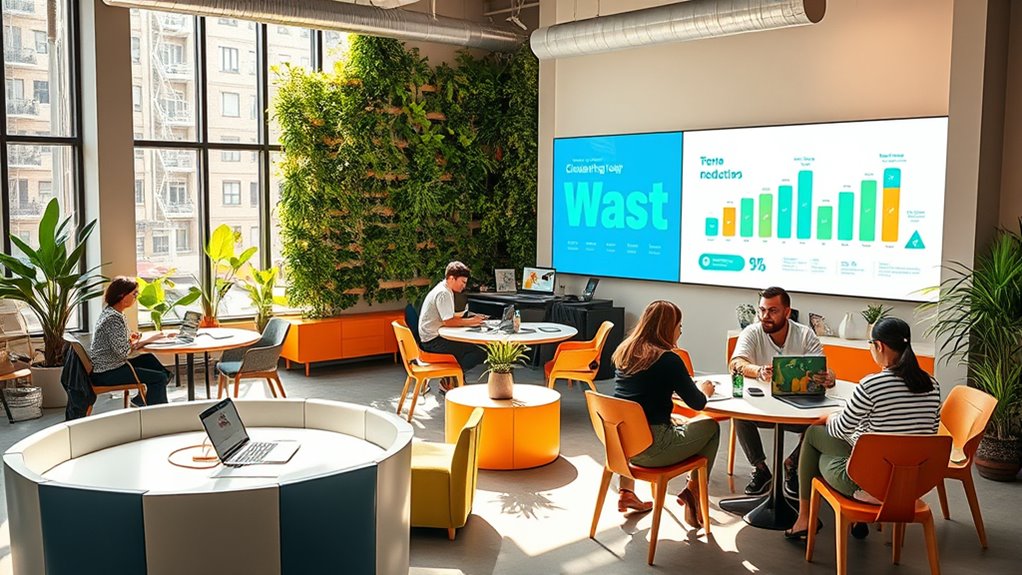Circular startups are revolutionizing business by turning waste into opportunity and prioritizing sustainability. They create a circular economy by focusing on reuse, repair, and recycling, while designing products for longevity. This approach not only minimizes environmental impact but also fosters customer loyalty and attracts investors interested in sustainability. By embracing innovative business models and leveraging technology, these companies show that profit and sustainability can go hand in hand. Discover the exciting details behind these impactful businesses.
Key Takeaways
- Circular startups minimize waste by emphasizing reuse, repair, and recycling in their business models to foster a sustainable economy.
- Innovative companies like Loop utilize subscription services with reusable packaging, promoting sustainable consumer experiences.
- Technology and data analytics enhance supply chain efficiency, optimize resource flow, and support informed purchasing decisions for eco-conscious consumers.
- By aligning with sustainability values, circular startups build customer loyalty and attract investors focused on environmental impact.
- These companies demonstrate that profitability and sustainability can coexist, offering a roadmap for a more sustainable economic future.

Have you ever wondered how startups can thrive while also promoting sustainability? Circular startups are redefining the business landscape by integrating eco-friendly practices into their core operations. These innovative companies focus on creating a circular economy, where waste is minimized, resources are reused, and products are designed for longevity. By embracing this model, they not only reduce their environmental impact but also open up new avenues for growth and profitability.
Imagine a world where products aren’t just discarded after use. Instead, they’re repaired, repurposed, or recycled. Circular startups are making this a reality. They prioritize sustainable materials and design products that can be easily taken apart, allowing for efficient recycling or refurbishment. This approach not only conserves resources but also builds customer loyalty. When you know your purchase contributes to a sustainable future, you’re more likely to return for more.
Circular startups are transforming waste into opportunity, creating products designed for longevity and fostering a sustainable future.
Take, for instance, companies like Loop, which offers a subscription service for everyday products in reusable packaging. You order your essentials, and once you’re done, you send the packaging back to be cleaned and reused. This model not only reduces waste but also creates a seamless experience for consumers. You get the convenience of online shopping without the guilt of contributing to landfills.
Moreover, circular startups often leverage technology to enhance their sustainability efforts. Many use data analytics to optimize their supply chains, ensuring that materials flow efficiently and waste is minimized. This tech-savvy approach not only streamlines operations but also helps you, as a consumer, make more informed choices. With clear information about the product’s lifecycle, you can feel empowered in your purchasing decisions. Understanding user data collection practices is essential for making informed choices in today’s marketplace.
Investors are also taking notice. As sustainability becomes a priority for consumers, they’re looking for startups that align with these values. When you support a circular startup, you’re not just making a purchase; you’re investing in a vision for a sustainable future. This trend is gaining momentum, and it’s becoming clear that businesses that ignore sustainability risk being left behind.
In essence, circular startups are paving the way for a more sustainable economy. They demonstrate that you don’t have to sacrifice profitability to make a positive impact. By closing the loop on waste and embracing eco-friendly practices, these companies offer a blueprint for a better tomorrow. So, next time you’re considering where to spend your money, think about the impact your choices can have. Supporting circular startups might be one of the most rewarding decisions you make.
Frequently Asked Questions
What Are Some Examples of Successful Circular Startups?
Some successful circular startups include Loop, which focuses on reusable packaging, and TerraCycle, known for recycling hard-to-recycle materials. You’ve also got companies like Made Trade, offering sustainable goods, and RePack, which provides a returnable packaging system. These startups not only reduce waste but also encourage consumers to rethink their purchasing habits. By supporting such ventures, you contribute to a more sustainable economy and help close the loop on resource use.
How Do Circular Startups Measure Their Environmental Impact?
You wouldn’t believe the magnitude of impact circular startups can have! They measure their environmental impact by tracking metrics like waste reduction, resource efficiency, and carbon emissions. By using life cycle assessments, they gauge the entire lifespan of their products, ensuring every aspect is optimized. They also collect data on customer feedback and community engagement, showing how their initiatives ripple through society. It’s all about making a difference, and they take it seriously!
What Challenges Do Circular Startups Typically Face?
Circular startups typically face challenges like securing funding, as investors might be hesitant about unproven business models. You’ve also got to navigate complex supply chains, which can complicate resource recovery and recycling efforts. Regulatory hurdles might slow you down too, as compliance with environmental laws is essential. Additionally, educating consumers on sustainable practices can be tough, since changing mindsets takes time and consistent effort. Balancing innovation and practicality is vital for success.
Are There Specific Industries More Suited for Circular Startups?
Yes, certain industries are more suited for circular startups. For instance, fashion, food, and electronics often embrace circular principles due to high waste levels and resource intensity. In fashion, you can repurpose materials, while the food industry can focus on waste reduction and composting. Electronics lend themselves to refurbishment and recycling. By targeting these sectors, you can create innovative solutions that not only reduce waste but also resonate with consumer demand for sustainability.
How Can Consumers Support Circular Startups in Their Communities?
You can support circular startups in your community by shopping locally and choosing products from these businesses. Engage with them on social media, share their initiatives, and encourage friends to do the same. Attend local events or workshops they host to learn more about their sustainable practices. Ultimately, provide feedback on their offerings; your insights can help them improve and grow, strengthening the circular economy in your area while fostering a sustainable lifestyle.
Conclusion
In a world where resources are finite, circular startups are paving the way for a sustainable future. By closing the loop, they not only reduce waste but also create innovative solutions that benefit both the planet and the economy. For instance, imagine a company that transforms discarded textiles into stylish, eco-friendly fashion items. This not only diverts waste from landfills but also inspires consumers to embrace sustainable choices, proving that business can thrive while protecting our environment.









